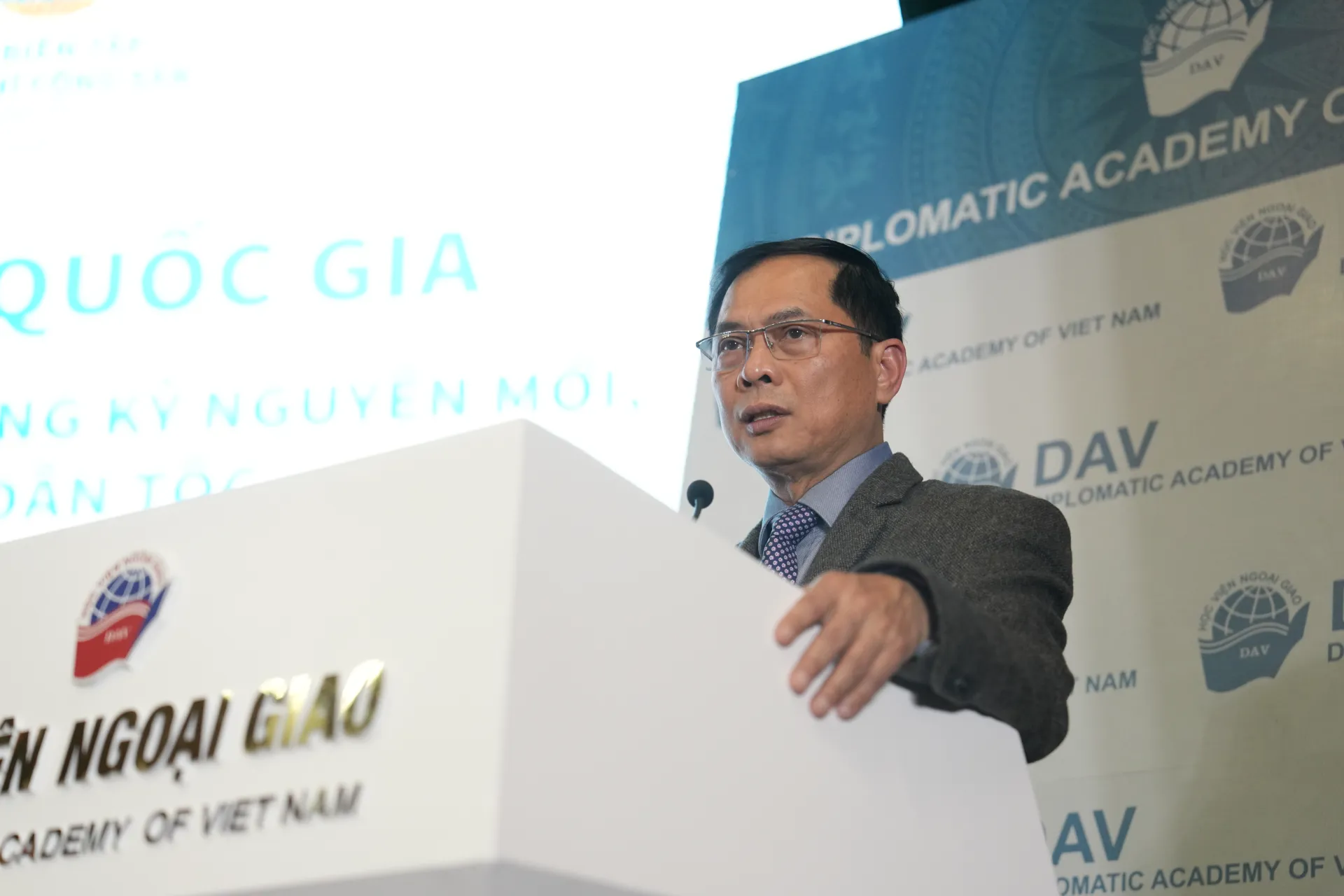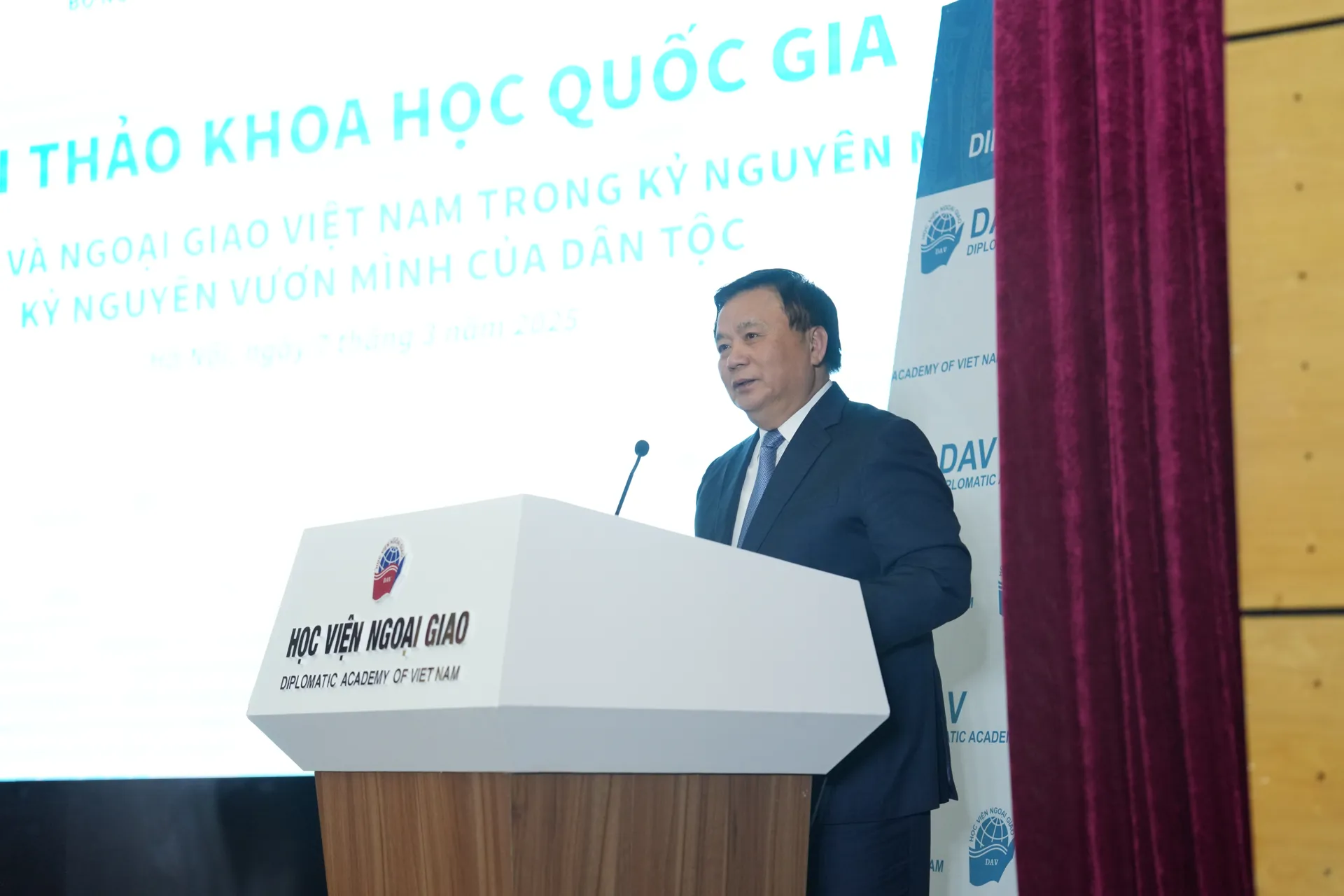Role of international dissemination in Vietnam’s new era
As Vietnam enters what has been termed “a new era, the era of the nation’s rise,” public diplomacy has emerged as a vital role for elevating the country’s global standing and strengthening international cooperation.
Public diplomacy, including foreign communication, is now important in shaping Vietnam’s narrative and supporting its ambitious vision of becoming a developed nation by 2045.

Deputy Prime Minister and Foreign Affairs Minister Bui Thanh Son delivers a speech at the conference held in Hanoi on March 7. Photo: Khanh Van/The Hanoi Times
Deputy Prime Minister and Foreign Affairs Minister Bui Thanh Son recently stressed the role of foreign communication in enhancing Vietnam’s values worldwide, saying it’s an integral part of comprehensive diplomatic strategies.
He said: “The goals and tasks set for foreign affairs, including international dissemination in this new phase are ambitious, requiring us to refine our theoretical basis for diplomacy in this era and establish a modern and professional diplomatic approach.”
Role of foreign communication
The the role of foreign affairs and international dissemination was once again affirmed at the national scientific conference titled “Vietnam’s Foreign Affairs and International Dissemination in the New Era – the Era of the Nation’s Rise,” held by the Ministry of Foreign Affairs at the Diplomatic Academy of Vietnam (DAV) in Hanoi in early March.
The event, gathered hundreds of participants from different ministries, organizations, and senior officials, including Nguyen Xuan Thang, Politburo member and Director of the Ho Chi Minh National Academy of Politics.
It stressed the importance of international dissemination in enabling Vietnam’s deeper integration and sustainable development, drawing on insights from conference delegates and situating it within Vietnam’s ambitious vision for progress.
Dr. Nguyen Hung Son, Acting Director of the Diplomatic Academy of Vietnam, said the conference offers a valuable opportunity for scholars, lecturers, and students to study, exchange ideas, and contribute to Vietnam’s diplomacy in this new era. He stated that foreign communication is a shared responsibility, engaging academia and youth in positioning Vietnam globally.
Delegates stated that foreign communication, including journalism, multimedia outreach, and public diplomacy, serves as a bridge connecting Vietnam to the global community. As Vietnam aims to become a developed nation by 2045, this tool conveys policies and promotes a dynamic, peaceful, and innovative Vietnam.
At the event, some key speakers emphasized the main function of foreign communication in strengthening Vietnam’s national brand. Media has leveraged Vietnam, a country with its rich history and vibrant culture, and achievements in multisectors, mainly economics. Agencies like the Vietnam News Agency (VNA), the Vietnam Television (VTV), the Voice of Vietnam (VOV), and Nhan Dan have expanded multilingual content, reaching millions globally.

Nguyen Xuan Thang, Director of the Ho Chi Minh National Academy of Politics, speaks at the event. Photo: Khanh Van/The Hanoi Times
Requirements in new era
Nguyen Xuan Thang, Politburo member and Director of the Ho Chi Minh National Academy of Politics, said: “Diplomacy in this new era must bridge internal strengths with external opportunities, seizing favorable conditions and resources to expand development space and create opportunities for economic breakthroughs.”
In this regard, international dissemination is crucial for presenting a modern Vietnam from high-tech hubs in Ho Chi Minh City to traditional craft villages in Hue, attracting investment and tourism, Thang stressed.
According to the delegates, foreign communication needs to help advance economic and cultural diplomacy. The speakers once again said it plays a pivotal role in supporting economic diplomacy, a central pillar in this era. Infact, media campaigns about free trade agreements (FTAs) and industries like semiconductors and artificial intelligence have helped Vietnamese businesses access global markets. At the same time, it promotes culture, a spiritual foundation of Vietnam’s diplomacy.
Sharing the same idea, Deputy Minister of Culture, Sports, and Tourism Le Hai Binh said: “In Vietnam’s comprehensive and modern diplomacy, political diplomacy leads, economic diplomacy breaks through, and cultural diplomacy forms the spiritual foundation of our diplomatic identity.” Events like Vietnam Culture Day in Japan and the Vietnam Film Festival in France, widely covered by media, showcase heritage and reinforce people-to-people ties.
Meanwhile, Hoang Trung Dung, Editor-in-Chief of Communist Review, highlighted foreign communication’s proactive nature in enabling Vietnam to capitalize on global trends like digital transformation and green economies while addressing competitive pressures.
“The nation’s development demands arise amid a rapidly evolving and complex global landscape, with intertwined opportunities and challenges. All sectors must adopt proactively to succeed,” he noted.
The delegates shared a common view that the new era demands that foreign communication adapt to the digital revolution. Social platforms like YouTube, Facebook, TikTok, and X have become key channels for Vietnam’s storytelling. The 2024 “Vietnam Rising” campaign, featuring videos on sustainable tourism, achieved 60 million global views, showcasing digital media’s power.
Deputy PM Bui Thanh Son reiterated the role of international dissemination, stating: “We must closely coordinate the three pillars: Party diplomacy, state diplomacy, and people’s diplomacy to mobilize the entire political system, creating a unified national strength.”
Accordingly, digitized foreign communication facilitates this, conveying messages from leaders to citizens and making policies widely spread.
In the new era, Vietnam’s international dissemination faces hurdles, notably competition in global media. Some international observers argue that media oversight may limit narrative diversity. However, Vietnam is progressing, expanding investigative journalism in areas like environmental protection and anti-corruption.
Politburo member Nguyen Xuan Thang affirmed: “Guided by Ho Chi Minh’s diplomatic thought and our national traditions, along with embracing global civilization, we must build a comprehensive and modern diplomacy.”
Foreign communication should innovate to balance national identity with international expectations, he suggested.
The delegates concluded that foreign communication will remain a driving force in Vietnam’s new era. Accordingly, the plans for 2025 in this field include expanding news agencies’ multilingual services and hosting international media forums, including the 2027 APEC Summit that is expected to provide a platform to affirm Vietnam’s global role.
Deputy PM Bui Thanh Son stressed: “Economic diplomacy will be the key pillar in Vietnam’s diplomacy in the era of the nation’s rise.” Foreign communication, as a tool for outreach and connection, will strongly support this goal, advancing Vietnam toward its vision of a developed and prosperous nation.
The delegates said international dissemination enables Vietnam to share its story with confidence and creativity. It is not just a tool but a mission to strengthen Vietnam’s integration and prominence on the world stage.








